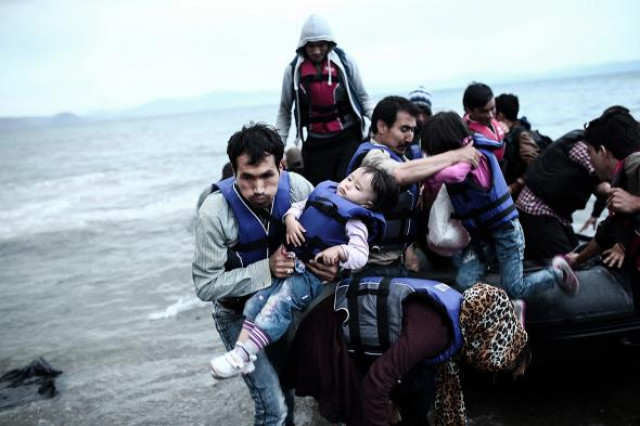Walls of intolerance
Western countries now reaping the refugee and asylum crisis are the victims of their own actions

Seven migrants drown off the Libyan coast in a shipwreck
PHOTO: FILE
On May 25, European Council President Donald Tusk warned that there were “alarming” numbers of potential migrants gathered in Libya seeking to cross the Mediterranean, a sea that is today a graveyard holding the corpses of thousands that have died trying to make the crossing. On May 23-24, 4,000 were rescued between Libya and Sicily. An unknown number drowned.

In the UK, the populace is preparing to vote in a referendum on June 23 on whether the UK should remain a part of the European Union (EU), or leave. The debate has been heated and fractious, and likely to get more so, with a strong element of the debate being around immigrants, refugees and asylum seekers — some from the EU itself but others, as with Germany, from the countries that have been torn apart in the wake of the Arab Spring. The far right of British politics is enjoying a resurgence — as is the far right in Germany and Austria. Everywhere the far right is surging, immigrants, refugees and asylum seekers are the target of their ire. Once tolerant countries such as Denmark are no longer so and the lights of liberalism are dimming across Europe.
Across the Atlantic in the US, Donald Trump has now gained sufficient delegates in the primary elections to win the nomination as presidential candidate in the election to be held in November. Mr Trump has proposed building a wall for the length of the Mexican border to prevent illegal immigration and has further proposed a ban on all new Muslim entrants to the US “until we know what’s going on”. America, more than any other leading power in the world today, has its very foundations rooted deep in immigrant and refugee communities that have found homes and safety on its shores. If Mr Trump wins in November — and he might — that could change.
Xenophobia and populist politics are rising almost wherever one cares to look, and intolerance is finding itself codified, if under the guise of “helping” as with the German legislation mentioned above. At the forefront of the crisis are Muslims, fleeing their homelands because of war or driven out by lack of opportunity and poverty. They do not gravitate to Muslim-majority countries, preferring Europe or the US with their developed social care and support systems and, hitherto, relatively liberal tolerance of minority communities. The vast majority of those now on the move for whatever reason are Muslim. They do not share all of the same values and priorities as the countries they seek entry to.
It can be credibly argued that the Western countries that are now reaping the refugee and asylum crisis are the victims of their own actions, both historical and much more recent. There can be no doubt that the artificial constructs that emerged with the fall of the Ottoman Empire and the carve-up of the Middle East in the years following the First World War were accidents waiting to happen — which they duly did. Western interventions post to the Arab Spring have been nothing short of disastrous — ill-conceived at best and with consequences not difficult to predict. It is going to get worse, probably a lot worse, before it gets any better.
Published in The Express Tribune, May 30th, 2016.
Like Opinion & Editorial on Facebook, follow @ETOpEd on Twitter to receive all updates on all our daily pieces.















COMMENTS
Comments are moderated and generally will be posted if they are on-topic and not abusive.
For more information, please see our Comments FAQ